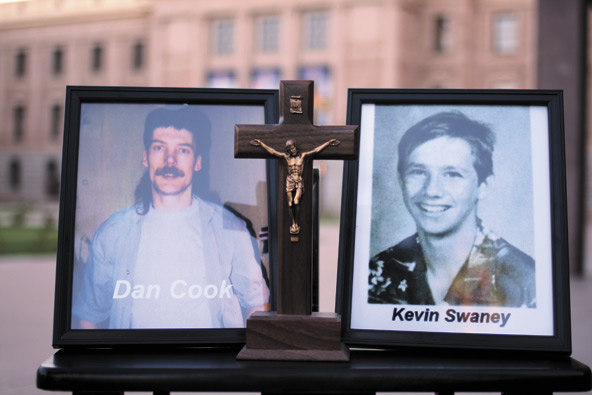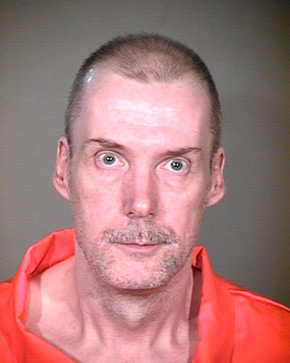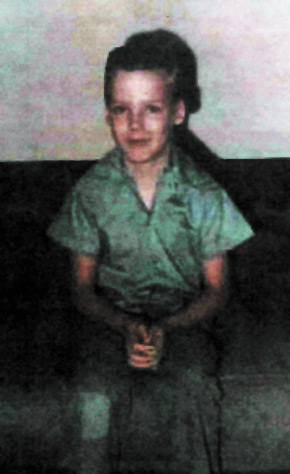
FLORENCE, Ariz. — Kevin Swaney’s family had waited for this day for nearly 25 years. One of the men who brutally killed their son and brother would be put to death — so long as he wasn’t given clemency.
The family went through a clemency hearing last year. The board granted the perpetrator reprieve, prolonging his life by a year, and prolonging the family’s agony, which began with the 1987 murders. Death penalty trials take more time, on average.
On Aug. 3, an official from Arizona State Prison Complex dialed family members on a speakerphone so they could participate in the hearing.
“Please hang on and put your phone on mute,” he said. “Thank you.”
A security guard sitting in a swivel chair fumbled with a handheld video camera until another guard showed up with a tripod.
Witnesses and court reporters sat in plastic chairs while attorneys and the clemency board sat before folding tables. Murals on the large, presumably multi-purpose room walls depicted the Arizona landscape.
With family members on the line, guards led one of the two men who murdered 16-year-old Kevin Swaney into the room. The wiry man’s hands and feet were shackled together, and he was locked up in a cage about the size of a Port-a-John.
The man, Daniel Wayne Cook, gestured to someone in the front row. “Are you OK?” Cook asked. It was his childhood friend Jack Donohue. Donohue nodded.
Cook, who on Aug. 8 became the fifth man executed by the state of Arizona this year, took his seat and waited for the hearing to commence. After a break, one of Swaney’s family members, not realizing those in the court could hear him, said, “We just need to close this (expletive) chapter. We need this to be over.”
An official warned him that if he didn’t mute his phone, he would not be allowed to participate in the proceedings. The Swaney family had adopted Kevin a few years before the murder, but he had run away.
The last time Arizona executed five inmates in a year was in 1999, when the state carried out nine such punishments. Last year, the state executed four men, and in 2010, one — Jeffrey Timothy Ladrigan.
“Capital punishment isn’t justice, it’s revenge,” said Dan Peitzmeyer, an anti-death penalty activist who joined with nearly 30 others for a protest vigil Aug. 7 at the Arizona State Capitol.
The group, which routinely holds vigils at 6 p.m. the night before state executions, prays for victims, their families and those on death row.
Chris Fleischman, a parishioner at St. Matthew Parish, noted how earlier that day Jared Lee Loughner pled guilty to killing six and injuring dozens during the Jan. 8, 2011, Tucson shootings. Loughner was given life in prison and victims’ families reported having closure.
“We have a selective view of the sanctity of life in our country and among Catholics,” Fleischman said.
Editorial: Opposed to the death penalty
The traditional teaching of the Catholic Church “does not exclude recourse to the death penalty, if this is the only possible way of effectively defending human lives against the unjust aggressor,” according to the Catechism. Yet in a 1997 update, which cites Blessed John Paul II’s Evangelium Vitae, the Catechism says such cases “are rare, if not practically non-existent.” Most governments can keep offenders from doing further harm through life imprisonment.
The number of executions in Arizona is expected to increase. Between 2001-2006, the state didn’t execute anyone due, in part, to a U.S. Supreme Court decision, Ring v. Arizona. The court ruled that jurors rather than a judge must determine eligibility for the death penalty. Capital cases decided before the ruling had to be reevaluated.
The U.S. Supreme Court also heard 2008’s Baze v. Rees, which challenged lethal injection as cruel and unusual punishment. While the court eventually rejected the challenge, hearing the case effectively stopped executions nationally until the decision.
According to a 2011 study by Judge Arthur L. Alacron, California capital trials cost 10 to 20 times more than murder trials that don’t involve the death penalty.
Double homicide
In a room surrounded by razor-wire fencing, Cook’s lawyer, Robin Konrad, began the clemency hearing by reading established details about the 1987 murder. These facts, she said, come from previous court rulings that found Cook and John Matzke guilty of killing Swaney and 26-year-old Carlos Froylan Cruz-Ramos, a Guatemalan immigrant.

The court found Cook guilty of two counts of first-degree murder and sentenced him to death. Matzke, who pled guilty to second-degree murder, served 20 years in prison and has been living in Tucson since 2007.
Many of the facts of the case come from Matzke, who testified against Cook. Cook said he doesn’t remember what happened that day, that he only sees “pictures,” “bits and pieces,” and doesn’t have complete memories.
On July 19, 1987, Cook stole around $90 from Cruz-Ramos, with whom he and Matzke shared an apartment. The three worked at a restaurant in Lake Havasu City. Cruz-Ramos soon realized his money had been taken. Matzke and Cook, drunk and high on methamphetamine, gagged and bound Cruz-Ramos to a chair, burning him with cigarettes.
For hours, the two men tortured and then raped Cruz-Ramos before strangling him to death.
Cook, hearing the gory details read by his lawyer, began to rock back and forth in his florescent orange jumpsuit. The rocking is a symptom of post-traumatic stress disorder, according to his defense team.
Swaney, who worked at the same restaurant as a dishwasher, arrived at the apartment two hours after Cruz-Ramos was killed. Cook, with Matzke’s help, tortured and raped the teenager before murdering him.
Toward the end of the hearing, Swaney’s family urged the board to neither commute Cook’s sentence nor to give him reprieve. They couldn’t bear to hear the facts of their brother’s death again.
A torturous past
The details of the murders established, Cook’s lawyer began to recount her client’s life before the murder. His mother drank while she was pregnant with him and he was born three months prematurely. His father beat his mother while she was pregnant and Cook was born with organic mental syndrome, or brain damage.

When he was an infant, his father burned him with cigarettes. His mother, whose love Cook continued to seek throughout his life, molested him.
“My relationship with my mother was sporadic and distant,” he said through a microphone in the cage. “One of the reasons she said she hated me so much is that I reminded her visually of my father.”
The clemency board asked Cook how many times his mother abused him. “Seven, eight, nine times,” he said, unsure.
“Why didn’t you tell anyone?”
“I didn’t want to lose my mother,” Cook answered.
His mother gave him and his sister to their grandparents. His grandfather bound Cook to a chair for punishment and sexually abused him and his sister.
After his grandmother died, Cook and his sister moved back in with his mother, who’d remarried. Her new husband beat Cook and the other children. The sexual abuse continued at his mother’s house, including abuse between Cook, his sister and their stepbrothers.
His mother, who suffers from several mental disorders, once asked Cook to sit next to her bed while she overdosed on pills. She wanted him to watch her die. His stepfather would blame Cook and his sister for their mother’s suicide attempts.
“Even though I was young, I could tell Dan was neglected,” Cook’s friend Donohue said during the hearing. They met in fourth grade.
Just before he was 15, Cook’s mother handed over custody to the State of California. Cook went to the McKinley Home for Boys in San Dimas, Calif. Once there, Cook said he would be abused around two times a week, “depending on how careless I was.”
One of the board members questioned the facts about Howard Bennett, Jr., a house parent at McKinley. Cook’s attorney explained that the accounts came from Bennett’s own trial. He’s a registered sex offender serving a 214-year sentence in California.
“If I didn’t do what [Bennett] wanted me to do, he’d sick his boys on me,” Cook said at the hearing. “They’d rape me, hold me down and beat me. He told me this could happen every night if I didn’t do what he said.”
Cook searched for an escape. “Drugs, alcohol, marijuana — anything that would slow my brain down,” he said. He also ran away from McKinley several times.
From there, Cook went to a few different homes before winding up with Lisa and Tom Maas. The couple has fostered children for decades. One Christmas they gave Cook a camera. He wept.
While at the Maas home, Cook’s family didn’t visit. Cook then spent a few months in the Army Reserves, but eventually attempted suicide. The suicide attempts continued over the years. Cook regularly saw mental health professionals for depression, alcoholism and acute psychosis, a temporary altered sense of reality.
Shortly before the murders, Cook’s yearlong girlfriend had broken off their relationship, ending plans to move in together. Cook then started living with Matzke, eventually getting a two-bedroom “party place.”
Cook quit his job the weekend of the killings, days before his birthday. His boss had told him to “not bring his problems to work,” and Cook couldn’t take the criticism. He’d recently stopped taking anti-anxiety medication because of the side effects.
25 years of torture
The morning after the murders, Matzke woke Cook. Matzke mentioned the killings, which he would later describe in detail to the police.
“At first, I didn’t believe him,” Cook said at the hearing, noting that Matzke would “make stuff up” when he was drunk. “I went upstairs and saw Carlos lying on the floor. I was actually shocked. I turned around and ran out the door.”
According to Mazke’s account, Cook was acting “crazy” during the murders. He had a “crooked smile” and was “drooling.” Cook accused Cruz-Ramos of being a spy and asked him to “take me to your leader,” making references to the CIA and Oliver North.
Once in prison, Cook began to receive regular psychiatric care. He became pen pals with several people, including Elizabeth McOwat in England who wrote a letter for the commutation of Cook’s sentence last year.
“We have prayed with him and tried to comfort him in his distress and fear, and discovered that actually Daniel has been comforting us,” she wrote. “In every letter he writes to my children, and to my friends, he asks for them to pray for me, and for them to help me through this dreadful time. Where does that come from?”
Near the end of the clemency hearing, Cook addressed Swaney’s family members listening in on the phone.
“My sincerest apologies for the pain my actions have caused,” he said. “I wish you all nothing but good from here on.”
His lawyer then asked him if he wanted to live.
“Yes,” he said.
“Why?”
“I think I can do a lot of good for a lot of people in prison,” Cook said, noting that he could get an education if he wasn’t on death row. “I can become a counselor for other prisoners.”
The Swaney family also had a chance to address the board.
One of the brothers, Shean, said a lot of people suffer difficult childhoods. “Not everyone grows up to be a demented child-molesting killer.”
Bridget Lester Swaney said the last 25 years have been torture for the family. “Daniel Wayne Cook shook my trust in people.”
Her brother, Robert, said Cook “needs to be gone. It’s too hard knowing this guy is alive.”
Cook began to rock in his seat again.
“We were all in foster care and we were abused also,” Kevin’s brother James said. “It’s time for him to make peace with his maker. His maker is not mine. He needs to make peace with his maker.”
The board voted that neither commutation nor reprieve would be granted. Melvin Thomas, new to the board, said he understood that Cook’s childhood had been tragic. “But it’s no excuse to visit on another what has been visited upon you.”
At the conclusion of the trial, a teary-eyed Cook looked over at his friend, Jack Donohue. Cook pumped his fist and gave his friend a thumbs up.
“It’s OK,” Cook nodded. “It’s OK.”






